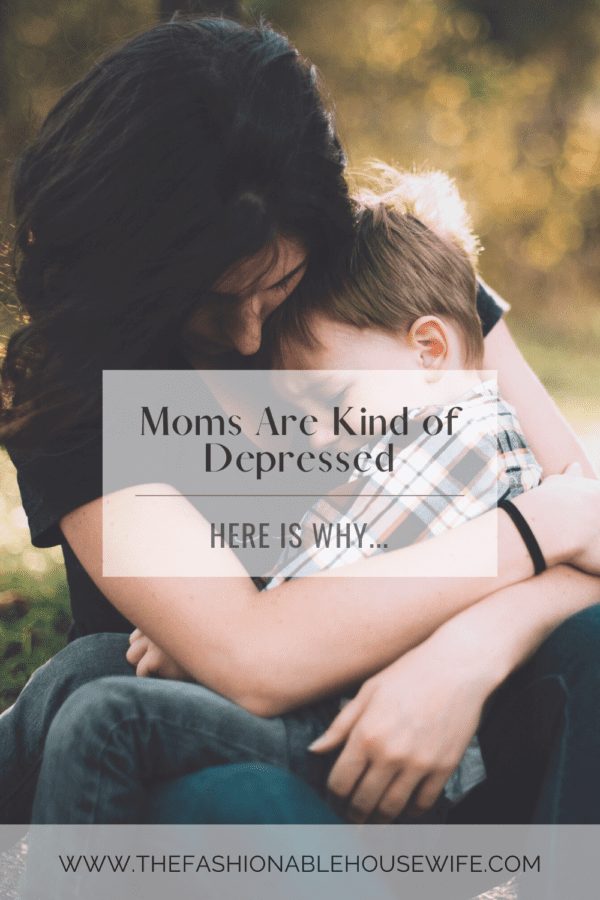
Being a mom is the most rewarding job there is. However, it is still a job–and it’s a job that you cannot clock out from. It never ends. Moms are easily overwhelmed and struggle to ask for help when needed.
It’s common for moms to feel isolated and alone, especially stay-at-home parents. Let’s explore why moms get depressed and how to understand and support them.
Mom Life Is Hard
Let’s face it; adulting is hard in general. Throw a kid or two in there, and things can quickly get out of hand. Being a mom comes with an abundance of pressure and responsibility that is highly stressful and hard to adjust to, even for the strongest, most resilient mom.
Too Much Pressure
The pressure is unreal for moms at times. Not only are they expected to keep their kids bathed, clothed, fed and healthy, but they’re also expected to do the same for themselves. On top of that, they’re usually in charge of maintaining the household.
This can include keeping up with their kids’ schedules, including doctor appointments and haircuts, pets, termite protection renewal, bills and more. Overwhelmed can be an understatement for moms that do this all by themselves.
Juggling Responsibilities
When moms work a full-time job, it can be challenging to juggle so many responsibilities. As previously mentioned– keep the house clean, keep up with appointments and extracurricular activities, and the list could go on and on.
Even with a spouse’s help, it can be challenging to juggle all these things simultaneously. A lack of teamwork can make a mom feel exasperated and, like her to-do list, can never be accomplished. Help her if you can.
Feeling Unappreciated
Feeling unappreciated can be a game changer for moms everywhere. Feeling like their spouse or children are ungrateful for everything they do can cause them to become depressed. Moms are superheroes.
They can ensure their kid’s gym shorts are washed before practice and their favorite snacks are in the cupboard, get them places on time and work a full-time job. How? They just do.
A partner’s help can make life so much easier as a parent but for some reason, dads aren’t held to as high of a standard as moms are. The expectations are lower and they can get away with a lot more in the eyes of society. It is an unfair assessment, but moms are judged much harsher than dads are.
Parenting takes a village and if a mom doesn’t have a partner, family members and friends would likely be glad to help. Parenting alone can be isolating and lead to depression if you don’t ask for help when needed.

Societal Roles of Women
Depression is a common illness with over 9.5% of Americans over eighteen being diagnosed annually. The stigma surrounding mental health is contributing to the behavioral health crisis in the U.S.
Women are much more likely to experience depression than men. Being a mom in this century doesn’t look the same as it has in the past because of the leaps and bounds women have made throughout history. Why, then, are they still expected to play the traditional roles women who weren’t allowed to work did? Why are they still doing it?
It’s possible it’s ingrained in women to care for those around them. It’s a maternal instinct like it is for men to provide and ensure their family is taken care of in a financial sense. Of mothers who share responsibilities with their spouses in the same home with their children, 64% admit they manage more than their partner about their schedules and activities.
Working a full-time job should take some of the strain off women’s household lives, but it doesn’t always work out that way. What are moms supposed to do when a nanny isn’t affordable and the cost of healthcare is increasing? Men and women are equally expected to work, so who is left to care for the children and maintain the household?
Why are these pressures so daunting? When women want to do all the things that being a mom encompasses but don’t have the time or energy because of their jobs, this can cause a strain on their emotions and livelihood.
Ultimately, teamwork is needed from both sides of the parental unit. When the foundation of partnership is solid and both parents are fulfilling their duties, it can make everything much smoother. When one parent slacks off, the other picks up the slack and vice versa. Mom and dad run like a well-oiled machine.

Types of Maternal Depression
Depression is not always caused by one specific thing. Depression can come from a culmination of things or it can come from absolutely nowhere. A hormonal imbalance in your brain can cause you to become depressed and not be able to see the glass as half full no matter how bad you want to.
Postpartum depression is a complication you experience after giving birth that includes mood swings, irritability and sadness, among other symptoms that last for an extended period of time. These emotions can be debilitating and extremely hard to explain.
Antidepressants can be helpful, but so can working through your feelings with loved ones. It’s all about finding what works best for your specific situation. If symptoms don’t start to improve after two weeks, consider reaching out for medical help.

How To Help Mom
Offer support and guidance to the mother in your life to help them cope with their depression. When they are feeling down, offer some ways they can boost their mood.
Try not to get frustrated if they don’t take your advice. Depression can manifest in many ways. Ensure your loved one knows you are there to support them in any way you can.





